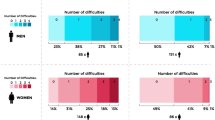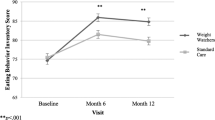Abstract
OBJECTIVE: To examine binge eating, depression, weight self-efficacy, and weight control success among obese individuals seeking treatment in a managed care organization.
DESIGN: Gender-stratified analyses of associations between binge eating, depression, weight self-efficacy, and weight change, using data from a randomized clinical trial that compared low-cost telephone-based, mail-based, and usual care interventions for weight loss.
SUBJECTS: A total of 1632 overweight individuals (460 men, 1172 women; mean age: 50.7 y; mean body mass index: 34.2 kg/m2) were recruited from a large Midwestern US managed care organization.
MEASUREMENTS: Height and weight were measured by study personnel at baseline, and self-reported weight was assessed at 6 and 12 months; self-reported depression status, binge eating, and self-efficacy for weight control were assessed at baseline.
RESULTS: Lifetime prevalence rates for depression and probable binge eating disorder were high. Weight self-efficacy was inversely related to weight in both men and women. For women, depression was associated with lower weight self-efficacy and higher body weight. Women reporting depression or lower weight self-efficacy at baseline had less weight loss success at 6 and 12 months. Depression, binge eating disorder, and weight self-efficacy were not significantly associated with weight loss success in men.
CONCLUSION: Negative emotional states are highly prevalent and predict poor treatment outcomes, particularly for obese women. As obese women with clinical depression typically are excluded from intervention studies, further research on how to address the intersection of obesity intervention and mood management may be warranted.
This is a preview of subscription content, access via your institution
Access options
Subscribe to this journal
Receive 12 print issues and online access
$259.00 per year
only $21.58 per issue
Buy this article
- Purchase on Springer Link
- Instant access to full article PDF
Prices may be subject to local taxes which are calculated during checkout
Similar content being viewed by others
References
Flegal KM, Carroll MD, Kuczmarski RJ, Johnson CL . Overweight and obesity in the United States: prevalence and trends, 1960–1994. Int J Obes Relat Metab Disord 1998; 22: 39–47.
Must A, Spadano J, Coakley EH, Field AE, Colditz G, Dietz WH . The disease burden associated with overweight and obesity. JAMA (1999); 282: 1523–1529.
Kuczmarski RJ, Flegal KM . Criteria for definition of overweight in transition: background and recommendations for the United States. Am J Clin Nutr 2000; 72: 1074–1081.
Mokdad AH, Serdula MK, Dietz WH, Bowman BA, Marks JS, Koplan JP . The spread of the obesity epidemic in the United States, 1991–1998. JAMA 1999; 282: 1519–1522.
Jeffery RW, Drewnowski A, Epstein LH, Stunkard AJ, Wilson GT, Wing RR, Hill DR . Long-term maintenance of weight loss: current status. Health Psychol 2000; 19 (Suppl 1): 5–16.
Stunkard AJ . Eating patterns and obesity. Psychiatr Q 1959; 33: 284–292.
Gormally J, Black S, Daston S, Rardin D . The assessment of binge eating severity among obese persons. Addict Behav 1982; 7: 47–55.
Marcus MD, Wing RR, Lamparski DM . Binge eating and dietary restraint in obese patients. Addict Behav 1985; 10: 163–168.
Spitzer RL, Devlin MJ, Walsh BT, Hasin D, Wing R, Marcus M, Stunkard AJ, Wadden T, Yanowski S, Agras S, Mitchell J, Nonas C . Binge eating disorder: a multisite field trial of the diagnostic criteria. Int J Eat Disord 1992; 11: 191–203.
Spitzer RL, Yanovski S, Wadden T, Wing R, Marcus MD, Stunkard A J, Devlin M, Mitchell J, Hasin D, Horne RL . Binge eating disorder: its further validation in a multisite study. Int J Eat Disord 1993; 13: 137–153.
Fairburn CG, Hay PJ, Welch SL . Binge eating and bulimia nervosa: distribution and determinants. In: Fairburn CG, Wilson GT (eds). Binge eating: nature, assessment, and treatment. Guilford Press: New York; 1993. pp 123–143.
Robertson DN, Palmer RL . The prevalence and correlates of binge eating in a British community sample of women with a history of obesity. Int J Eat Disord 1997; 22: 323–327.
American Psychiatric Association. Diagnostic and statistical manual of mental disorders, 4th edn. APA: Washington, DC; 1994.
Smith DE, Marcus MD, Lewis CE, Fitzgibbon M, Schreiner P . Prevalence of binge eating disorder, obesity, and depression in a biracial cohort of young adults. Ann Behav Med 1998; 20: 227–232.
Telch CF, Agras WS, Rossiter EM . Binge eating increases with increasing adiposity. Int J Eat Disord 1988; 7: 115–119.
Agras WS, Telch CF, Arnow B, Eldredge K, Marnell M . One-year follow-up of cognitive-behavioral therapy for obese individuals with binge eating disorder. J Consult Clin Psychol 1997; 65: 343–347.
Sherwood NE, Jeffery RW, Wing RR . Binge status as a predictor of weight loss treatment outcome. Int J Obes Relat Metab Disord 1999; 23: 485–493.
Carpenter KM, Hasin DS, Allison DB, Faith MS . Relationships between obesity and DSM-IV major depressive disorder, suicide ideation, and suicide attempts: results from a general population study. Am J Public Health 2000; 90: 251–257.
Roberts RE, Kaplan GA, Shema SJ, Strawbridge WJ . Are the obese at greater risk for depression? Am J Epidemiol 2000; 152: 163–170.
Musante GJ, Costanzo PR, Friedman KE . The comorbidity of depression and eating dysregulation processes in a diet-seeking obese population: a matter of gender specificity. Int J Eat Disord 1998; 23: 65–75.
Wadden TA, Stunkard AJ . Psychopathology and obesity. Ann NY Acad Sci 1987; 499: 55–65.
Andersen RE, Wadden TA, Bartlett SJ, Zemel B, Verde TJ, Franckowiak SC . Effects of lifestyle activity vs structured aerobic exercise in obese women: a randomized trial. JAMA 1999; 281: 335–340.
Tate DF, Wing RR, Winett RA . Using internet technology to deliver a behavioral weight loss program. JAMA 2001; 285: 1172–1177.
Bandura A . Self-efficacy: toward a unifying theory of behavioral change. Psychol Rev 1977; 84: 191–215.
Clark MM, Abrams DB, Niaura RS, Eaton CA, Rossi JS . Self-efficacy in weight management. J Consult Clin Psychol 1991; 59: 739–744.
Cargill BR, Clark MM, Pera V, Niaura RS, Abrams DB . Binge eating, body image, depression, and self-efficacy in an obese clinical population. Obes Res 1999; 7: 379–386.
Dennis KE, Goldberg AP . Weight control self-efficacy types and transitions affect weight-loss outcomes in obese women. Addict Behav 1996; 21: 103–116.
Bernier M, Avard J . Self-efficacy, outcome, and attrition in a weight-reduction program. Cognit Ther Res 1986; 10: 319–338.
Forster JL, Jeffery RW . Gender differences related to weight history, eating patterns, efficacy expectations, self-esteem, and weight loss among participants in a weight reduction program. Addict Behav 1986; 11: 141–147.
Prochaska JO, Norcross JC, Fowler JL, Follick MJ, Abrams DB . Attendance and outcome in a worksite weight control program: processes and stages of change as process and predictor variables. Addict Behav 1992; 17: 35–45.
Stotland S, Zuroff DC . Relations between multiple measures of dieting self-efficacy and weight change in a behavioral weight control program. Behav Ther 1991; 22: 47–59.
Fontaine KR, Cheskin LJ . Self-efficacy, attendance, and weight loss in obesity treatment. Addict Behav 1997; 22: 567–570.
Miller PM, Watkins JA, Sargent RG, Rickert EJ . Self-efficacy in overweight individuals with binge eating disorder. Obes Res 1999; 7: 552–555.
Goodrick GK, Pendleton VR, Kimball KT, Poston WSC, Reeves RS, Foreyt JP . Binge eating severity, self-concept, dieting self-efficacy and social support during treatment of binge eating disorder. Int J Eat Disord 1999; 26: 295–300.
Fairburn CG, Doll HA, Welch SL, Hay PJ, Davies BA, O'Connor ME . Risk factors for binge eating disorder: a community-based, case–control study. Arch Gen Psychiatry 1998; 55: 425–432.
Marcus MD, Wing RR, Ewing L, Kern E, Gooding W, McDermott M . Psychiatric disorders among obese binge eaters. Int J Eat Disord 1990; 9: 69–77.
Jeffery RW, Sherwood NE, Brelje K, Pronk NP, Boyle RG, Boucher JL, Hase K . Mail and phone interventions for weight loss in a managed-care setting: Weigh-to-Be one-year outcomes. Int J Obes Relat Metab Disord 2003; 27: 1584–1592.
Pronk NP, Boucher JL, Gehling E, Boyle RG, Jeffery RW . A platform for population-based weight management: description of a health plan-based integrated systems approach. Am J Managed Care 2002; 8: 847–857.
Masheb RM, Grilo CM . Accuracy of self-reported weight in patients with binge eating disorder. Int J Eat Disord 2000; 29: 29–36.
Palta M, Prineas RJ, Berman R, Hannan P . Comparison of self-reported and measured height and weight. Am J Epidemiol 1982; 115: 223–230.
Tell GS, Jeffery RW, Kramer FM, Snell MK . Can self-reported body weight be used to evaluate long-term follow-up of a weight-loss program? J Am Diet Assoc 1987; 87: 1198–1201.
Raciti MA, Murphy J, Ward K, Leshine P, Fowler J, Abrams D, Follick M . Self-reported weight at the worksite: a validation study. Proceedings of the seventh annual meeting of the Society of Behavioral Medicine, March 1986, San Francisco, California.
Jeffery RW . Bias in reported body weight as a function of education, occupation, health and weight concern. Addict Behav 1996; 21: 217–222.
Stunkard AJ, Albaum JM . The accuracy of self-reported weights. Am J Clin Nutr 1981; 34: 1593–1599.
Stewart AL . The reliability and validity of self-reported weight and height. J Chron Dis 1982; 35: 295–309.
Pirie P, Jacobs D, Jeffery RW, Hannan P . Distortion in self-reported height and weight data. J Am Diet Assoc 1981; 78: 601–606.
SAS Institute. SAS OnlineDoc, version 8, SAS: Cary, NC 1999.
Cohen J . Statistical power analysis for the behavioral sciences. 2nd edn. Lawrence Erlbaum Associates: Hillsdale, NJ; 1988.
Santor DA, Coyne JC . Shortening the CESD to improve its ability to detect cases of depression. Psychol Assess 1997; 9: 233–243.
Hankey CR, Leslie WS, Lean MEJ . Why lose weight? Reasons for seeking weight loss by overweight but otherwise healthy men. Int J Obes Relat Metab Disord 2002; 26: 880–882.
Wolfe BL, Smith JE . Different strokes for different folks: why overweight men do not seek weight loss treatment. Eat Disord 2002; 10: 115–124.
Paeratakul S, Lovejoy JC, Ryan DH, Bray GA . The relation of gender, race and socioeconomic status to obesity and obesity comorbidities in a sample of U.S. adults. Int J Obes Relat Metab Disord 2002; 26: 1205–1210.
Acknowledgements
This research was supported by National Institute of Diabetes and Digestive and Kidney Diseases Grant 1R01-DK53826-01A1. We thank anonymous reviewers for their comments on an earlier draft of this manuscript.
Author information
Authors and Affiliations
Corresponding author
Rights and permissions
About this article
Cite this article
Linde, J., Jeffery, R., Levy, R. et al. Binge eating disorder, weight control self-efficacy, and depression in overweight men and women. Int J Obes 28, 418–425 (2004). https://doi.org/10.1038/sj.ijo.0802570
Received:
Revised:
Accepted:
Published:
Issue Date:
DOI: https://doi.org/10.1038/sj.ijo.0802570
Keywords
This article is cited by
-
Subjective and objective binge episodes in relation to eating disorder and depressive symptoms among middle-aged women
Eating and Weight Disorders - Studies on Anorexia, Bulimia and Obesity (2022)
-
Relationship of depression, impulsivity, distress intolerance and coping styles with maladaptive eating patterns in bariatric candidates
Eating and Weight Disorders - Studies on Anorexia, Bulimia and Obesity (2022)
-
Disinhibition and Subjective Hunger as Mediators Between Weight Bias Internalization and Binge Eating Among Pre-Surgical Bariatric Patients
Obesity Surgery (2021)
-
Predictors of Binge Eating among Bariatric Surgery Candidates: Disinhibition as a Mediator of the Relationship Between Depressive Symptoms and Binge Eating
Obesity Surgery (2018)
-
Pathological Overeating: Emerging Evidence for a Compulsivity Construct
Neuropsychopharmacology (2017)



